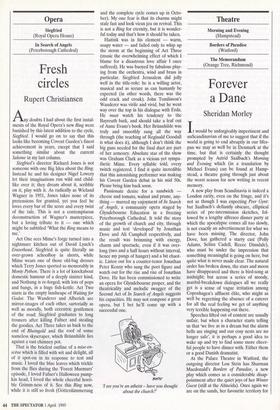Opera
Siegfried (Royal Opera House) In Search of Angels (Peterborough Cathedral)
Fresh circles
Rupert Christiansen
Arly doubts I had about the first instal- ments of the Royal Opera's new Ring were banished by this latest addition to the cycle, Siegfried. I would go on to say that this looks like becoming Covent Garden's finest achievement in years, except that I said something similar about the current Salome in my last column.
Siegfried's director Richard Jones is not someone with one Big Idea about the Ring. Instead he and his designer Nigel Lowery let their imaginations run wild and child- like over it; they dream about it, scribble on it, play with it. As radically as Wieland Wagner in 1951, Jones takes none of its pretensions for granted, yet you feel he loves every bar of the score and every twist of the tale. This is not a contemptuous deconstruction of Wagner's masterpiece, but a loving tribute to it — one which might be subtitled 'What the Ring means to me.'
Act One sees Mime's forge turned into a nightmare kitchen out of David Lynch's Eraserhead. Siegfried is quite literally an over-grown schoolboy in shorts, while Mime wears one of those old-bag dresses which Terry Jones sported so memorably in Monty Python. There is a lot of knockabout domestic humour of a deeply sinister kind, and Nothung is re-forged, with lots of pops and bangs, in a huge fish-kettle. Act Two starts in the empty landscape of Waiting for Godot. The Wanderer and Alberich are mirror-images of each other, sartorially as well as morally, both eccentric gentlemen of the road; Siegfried graduates to long trousers after killing Fafner and stealing the goodies. Act Three takes us back to the end of Rheingold and the roof of some nameless skyscraper, which Briinnhilde lies against a vast chimney pot.
That is the briefest outline of a mise-en- scene which is filled with wit and delight, all of it spot-on in its response to text and music. I loved the blue leaves which trickle from the flies during the 'Forest Murmurs' episode, I loved Fafner's Halloween pump- kin head, I loved the whole cheerful horri- ble Grimm-ness of it. See this Ring now, while it is still so fresh (Gotterdammerung and the complete cycle comes up in Octo- ber). My one fear is that its charms might stale fast and look vieux jeu on revival. This is not a Ring for eternity, but it is wonder- ful today and that's how it should be taken.
Haitink was in his element — warm, soapy water — and failed only to whip up the storm at the beginning of Act Three (music the overwhelming effect of which I blame for a disastrous love affair I once suffered). He was buoyed by fabulous play- ing from the orchestra, wind and brass in particular. Siegfried Jerusalem did jolly well in the title-role: he is a willing actor, musical and as secure as can humanly be expected (in other words, there was the odd crack and croak). John Tomlinson's Wanderer was virile and vivid, but he went way over the top in his dialogue with Erda. He must watch his tendency to the Bayreuth bark, and should take a leaf out of Anne Evans's book. Her Briinnhilde was truly and smoothly sung all the way through (the teaching of Reginald Goodall is what does it), although I don't think the big guns needed for the final duet are part of her armoury. Absolute star of the show was Graham Clark as a vicious yet sympa- thetic Mime. Every syllable told, every twitch registered. I find it quite incredible that this astonishing performer was making his Covent Garden debut in his mid 50s. Please bring him back soon.
Passionate desire for a sandwich cheese and tomato, walnut and prune, any- thing — marred my enjoyment of In Search of Angels, a community opera staged by Glyndebourne Education in a freezing Peterborough Cathedral. It told the story of the growth of church and city, through music and text 'developed' by Jonathan Dove and Ali Campbell respectively, and the result was brimming with energy, charm and spectacle, even if it was over- long (two and a half hours without interval, hence my pangs of hunger) and a bit chaot- ic. Listen out for a counter-tenor Jonathan Peter Kenny who sung the poet figure and watch out for the rise and rise of Jonathan Dove. He has been commissioned to write an opera for Glyndebourne proper, and the theatricality and melodic swagger of the Second Act of In Search of Angels suggests his capacities. He may not compose a great opera, but I bet he'll come up with a successful one.
' see you're an atheist - have you thought about the church?'


























































 Previous page
Previous page